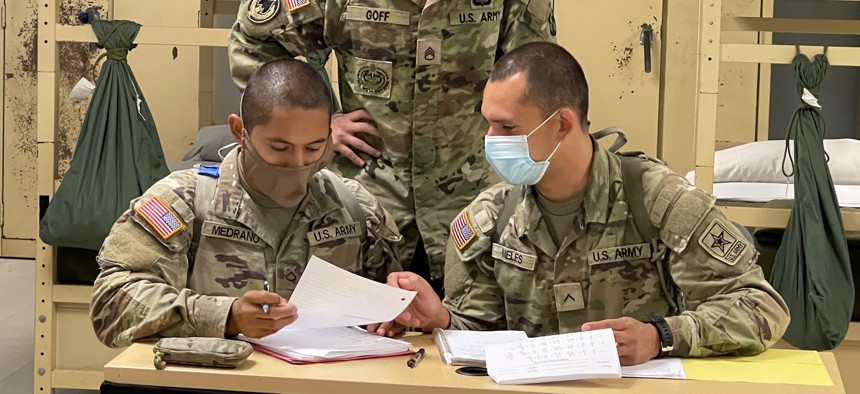
An instructor looks on as two students work during study hall at the Army's new Future Soldier Preparatory Course at Fort Jackson, S.C. Defense One / Caitlin M. Kenney
Army Prep Course Aims to Pull Youth Up to Recruiting Standards
Pilot program teaches students math, vocab, test-taking, and military discipline.
FORT JACKSON, S.C.—While a man dissects a math problem on a whiteboard at the front of a classroom, some of his students call out responses while others hunch over worksheets at their desks. The scene might be mistaken for a high-school class were it not for the Army uniforms worn by the students and instructors and the posters highlighting Army values and a warrior ethos.
The class is part of the new Future Soldier Preparatory course, a pilot program to help recruits who come up short on fitness or academic standards to improve and move onto basic training.
“This is really important for me what we're trying to do and really for the Army,” Army Chief of Staff Gen. James McConville told reporters traveling with him. “It's a challenge right now to get young men and women that are qualified to serve.”
McConville visited Fort Jackson on Aug. 26 to learn more about the program, which started earlier this month with 142 students. Several more groups will cycle through over the next year, according to Lt. Col. Ebony Calhoun, a spokeswoman for McConville. The program cost $4 million to stand up and is projected to cost another $6 million to run through September 2023, she said. If it works, officials said, the Army may make the course permanent and expand it to other basic training locations.
The prep course was founded to help the military services face the worst recruiting environment in decades. Of Americans 17 to 24 years old, only 23 percent are “fully qualified to serve,” Lt. Gen. Maria Gervais, the deputy commander of U.S. Army Training and Doctrine Command, said on July 26. The Army is expected to shrink to about 466,000 by the end of the fiscal year next month and may decline to 445,000 next year, according to a July memorandum by McConville and Army Secretary Christine Wormuth, which called for the prep course.
Some have suggested that military efforts to reduce racism, promote diversity, and root out extremists—efforts critics have derisively called “woke”—are turning off potential recruits. McConville said he does not have a response for that characterization, other than to say European allies have told him in recent months they want to work with American soldiers.
“Because where the American soldier goes, it's been said, freedom follows,” he said. “But I would argue in Eastern Europe where American soldiers go, freedom stays. And I'm not going to even comment on those who want to try to describe our soldiers in any other way than they're the greatest soldiers in the world.”
The Future Soldier Preparatory course is not the first time the Army has established a program at Fort Jackson for recruits to improve their enlistment prospects. In the early 2000s, the service created a school there to help recruits earn their general educational development or GED diploma, and more than 2,700 people were able to enlist, Gervais said.
The people who attend the new program must meet the bare minimum to be considered for enlistment, and will be placed in a “delayed” training status to improve their test scores. The pilot program is split into two tracks: one for those whose armed services vocational aptitude battery score needs to improve, and those whose body fat is up to 6 percent over what is allowed. These students have drill instructors as teachers, with specialization in subjects like math or vocabulary, and they are also taught Army customs and discipline.
Students have 90 days to improve their deficiencies, and if they do, they can renegotiate their contracts based on their new scores—such as their job and possible bonuses—said Brig. Gen. Patrick Michaelis, the commander of Fort Jackson. If they do not improve, they will be discharged, but can try enlisting again in six months.
“When I think about this, I think about it from the academic perspective is… we're tapping into an individual's true aptitude,” he said about the mission of the course.
McConville’s visit showcased only the academic track of the program, not those who are addressing their body composition with fitness training. He saw students on the academic track in classrooms and in “study hall,” which appeared to be their sleeping area.
Students are also taught test-taking skills, which Michaelis said have worsened due to the pandemic, pointing to the 9 percent drop in ASVAB scores in recent years.
“We want to be part of the solution in creating the Army we want for tomorrow, rather than waiting for society to show up already qualified,” Michaelis said. “We need to be part of the solution to make them prepared to be in the Army.”
Leaders at Fort Jackson did not start the course from scratch when they were instructed to stand it up in June. Instead, they looked to the Army’s basic skills education program, which helps soldiers study and get a higher score on their armed forces classification test to move into another job. They also reached out to other similar programs in the military for tips, including the United States Military Academy at West Point’s own preparatory school.
According to a slide presented during McConville’s visit, 75 percent of students so far have moved up to a higher score category that allows for more job opportunities in the Army. A day before McConville’s visit, 84 students graduated from the program, Michaelis said.
Staff Sgt. Jonathan Tenorio, an infantryman and drill sergeant, said the prep course changed his job from being a drill sergeant—where he would typically be yelling and telling people what to do—to an instructor that teaches and converses with the students.
Tenorio teaches word knowledge, vocabulary, and paragraph comprehension to the students, many of whom have been out of school for a few years. They start with the basics and show multiple ways to approach the material, “because everybody's different,” he said.
Having a soldier as an instructor also gives students an opportunity to learn more about the Army and the available career opportunities. Tenorio said some students have said they want to change the job they had initially signed up for based on what they learned from instructors.
Gabriel Reynolds, 33, is from Truth or Consequences, New Mexico, and part of the newest class of students in the program. He said he has wanted to join the military since he was young, after seeing National Guard members in his town for training. However, his dyslexia has made getting in difficult. Reynold’s most recent score on the ASVAB was 28, placing him a few points below the Army minimum of 31. He hopes the program will help him get an 88 and become a combat engineer in the Army Reserve.
“The reason why I joined the Army Reserves is because [it’s] something I wanted to do, and I wasn't going to listen to people telling me, ‘Hey, since you're dyslexic [you] can't do it,’” he said.
So far, participants have raised their scores an average of 14.5 points, according to one slide. One person boosted their score by 59 points.
Another student is Damian Chapa, 18, from San Diego, Texas, who wanted to join the Army because he and his family have struggled to make a living in his small town. He sees military service as the best way to leave and to learn skills for a future job.
“Once my recruiter had called my mom, I had learned that there was a way out. And I felt that this was God's calling to be able to get me out of my town,” Chapa said.
It has taken him two years to get into the Army and he encourages others to not give up.
“Don't let the test get you down,” he said. “Keep on doing it because there is an opportunity out there. Like for me, for instance, I’ve taken the ASVAB too many times and I've been at this for two years. So there is hope out there for others who are struggling with the same problem.”
During a meet-and-greet with some of the new students, McConville talked about what he’s learned about the program and encouraged them to stay motivated.
“What we're doing for you all is we're going to give you the time, we're going to give you the instruction, and we're going to give you the resource you need to realize your full potential,” the chief of staff said. “What we need from you is your commitment, that your passion [is] to be a soldier, because you're going to have to work hard. You know, we can't do it for you, you've got to want to do it.”
McConville said he sees the program being scaled up and having it at the other three training centers, bringing in thousands of students.
“I see this as a long-term program. This is not something we're doing very short-- I think we have to holistically invest in American youth…There's a competition for talent in the nation right now,” he said.
Throughout the day, he emphasized that the Army will not lower standards to bring in less-qualified soldiers.







